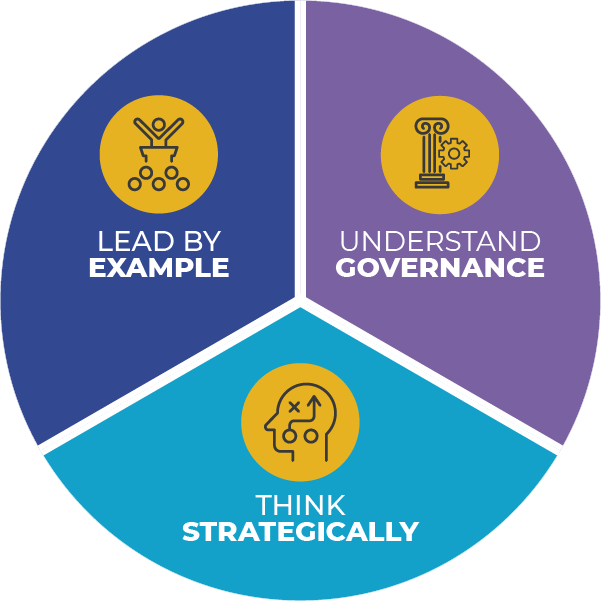
You are viewing the Institutionally Related Foundation version of this CEO Update. System and Institution versions are also available.
Board service is a team sport, and strategic governing boards act collectively to perform their duties while knowing the impact of the board is only as strong as its individual members. Further, consequential board members consistently ask themselves how they can best contribute individually to the outcomes that advance the foundation and institution they serve.
What can individual board members do to make their service more productive, effective, and meaningful? They can rely upon AGB’s Principles of Trusteeship.
Thoughtful and engaged board members leverage the Principles of Trusteeship to inform their perspectives, guide their actions and decisions, and sharpen their strategic priorities and desired outcomes.
Why it matters: Strategic governing board members focus on outcomes and priorities. Importantly, they can only do so effectively if they understand governance, think strategically, and lead by example, which are the three primary functions of board member service described in Principles of Trusteeship.

Consider how the Principles of Trusteeship would guide your thinking in the following scenarios:
Principle 2: Respect the difference between the board’s role and the administration’s role.
- In an email to the university president, the advancement committee chair said, “Our chief development officer has been absolutely terrific on the capital campaign this year, and I think a significant raise plus a sizable bonus would be in order when we set compensation for the upcoming year.” The president responded, “Thanks for the positive feedback. It’s so great when a regent recognizes the hard work of our leadership team.” What the president didn’t know was that, separately, the committee chair had asked the vice president for human resources to provide compensation data for chief development officers at 10 peer institutions. How should the board chair and president respond?
Principle 5: Think independently and act collectively.
- A member of the state legislature calls his friend, a recently elected board chair of an institutionally related foundation, to request advice on a novel state initiative to generate funding for student scholarships. The lawmaker wants public support from the state’s colleges and universities. He asks the board chair for help from the foundation when he brings the idea to the institution’s president. What should the board chair do?
Principle 8: Focus on what matters most to long-term sustainability.
- The institution’s administration is facing a budget gap stemming from declines in state funding and lower than anticipated enrollment. At the same time, the president is keen to move forward with some strategic initiatives that require significant investment but have the potential to strengthen the institution’s long-term business model. The president has asked the institution to increase its annual endowment distribution to help close the budget gap and free up funds for strategic priorities. A foundation board member, a seasoned investment professional, has concerns that anticipated market declines will yield lower investment returns over the next year and depress the value of some endowment accounts below the value at which they were created. What approach might the board member take to address this concern with the rest of the board?
Go Deeper:
- Read more about the Principles of Trusteeship and learn how they strengthen board members’ capabilities and augment boards’ capacity.
- Review the Trusteeship magazine article “What Kind of Board Member Are You?”
- Review the Principles of Trusteeship with a trusted AGB facilitator at your next board meeting or retreat.
Questions for Board and Committee Chairs
- How can you encourage your fellow board members to review and reflect on the Principles of Trusteeship?
- How will the principles guide your service as a board or committee chair?
Questions for Board Members
- How will you use the Principles of Trusteeship to enhance your board service?
- How can you hold yourself and your fellow board members accountable for creating an effective board culture?
Questions for Chief Executive Officers and Leadership Team Members
- How can you help reinforce the tenets contained in the Principles of Trusteeship?
- How might the Principles of Trusteeship be adopted into board orientation and ongoing education?
An insight that sticks with me from one of the Principles of Trusteeship authors is that board service is not about sitting on the board; it is about serving on the board, by preparing, attending, and speaking during board meetings. With that in mind, I hope you enjoy the rest of your summer feeling confident, energized, and prepared to offer your service to your students, your institution, your foundation, and your board.



